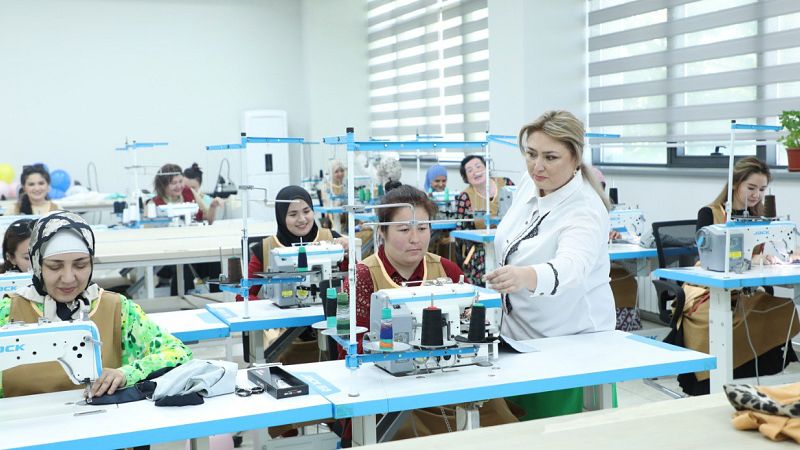Training for tomorrow: Uzbekistan’s new labour strategy

As global labour markets undergo rapid change due to automation, artificial intelligence, and shifting economic demands, Uzbekistan is reassessing its approach to preparing its workforce. The country is shifting its focus from merely counting jobs to building a skilled and adaptable workforce.
This shift is part of broader efforts to improve employment outcomes, reduce poverty, and ensure that vocational education responds to the realities of the labour market.
According to the press service of the president of Uzbekistan, at the beginning of the year, the government set a goal to create 5.2 million job opportunities, provide professional training to over 1 million people, and lift 1.5 million individuals out of poverty by the end of 2025. Notably, in the first half of the year alone, more than 3 million people had already been engaged in paid employment.
As of June 2025, the unemployment rate in Uzbekistan stood at around 5.1%, representing more than 781,600 people. There were also approximately 4.9 million economically inactive individuals in the country. This group includes individuals currently engaged in activities such as studying, caring for children or family members, taking maternity leave, or those who are not in a position to take up employment immediately.
According to the government, a plan to create 5.2 million jobs addresses the needs of new labour market entrants, including university and college graduates, returning labour migrants, those seeking better job opportunities, and underemployed individuals. The employment strategy is designed not only to lower joblessness but also to stimulate economic growth and reduce poverty on a broader scale.
From jobs to skills: A change in focus
The country has expanded vocational training opportunities to ensure that more people, especially those currently unemployed or underemployed, can acquire practical skills aligned with real economic needs.
Currently, the country has 80 vocational skills centres that can train about 250,000 people annually. Short-term courses lasting 1 to 6 months have been organised to prepare individuals for professions that are in high demand in the labour market. These courses may teach skills related to computer graphics, web programming, and foreign languages, for example. In newly emerging and rapidly growing service sectors, practical training is also provided for professions like call-centre operators, HR inspectors, and secretary-receptionists.
Euronews spoke to Shahlo Turgunova, a young trainee, who shared her experience in the Tashkent region.
“My interest in the vocational skills centre has grown even more,” she said.
Shahlo is currently studying at the Akkurgan district vocational skills centre, where training in modern, market-relevant professions is continuously offered. A four-way partnership agreement has been signed with a tailoring company to train skilled specialists according to the client’s needs.
Addressing the skills gap
Despite Shahlo’s enthusiasm, challenges remain. According to recent data, nearly 45% of employers in Uzbekistan report difficulties finding skilled workers, a reflection of the gap between training programmes and labour market demands.
In the past, some employers were hesitant to openly share job vacancies with state employment centres due to legal obligations, such as penalties for failing to hire referred candidates. This resulted in incomplete labour market data, making it challenging to plan effective training programmes.
To address this, Uzbekistan is now taking a more coordinated approach. Training programmes are aligned with actual job vacancies, employers can now post jobs without fear of penalties, and employment centres act as intermediaries, helping connect job seekers with employers more efficiently and transparently.
Involving the private sector in training
While vocational centres have traditionally been state-funded, there are now efforts to involve the private sector in training delivery and infrastructure.
“Currently, all vocational skills centres in the republic are publicly funded,” said Farrukh Hamroev, chief specialist in the Ministry of Employment and Poverty Reduction of the Republic of Uzbekistan. “If we involve the private sector, they can invest through this partnership, renovate the centres, and train more qualified personnel,” he explained.
In the Kibray district, a centre is being redeveloped to specialise in construction and equipment manufacturing. The project is worth approximately €545,000, with more than €136,000 coming from private investors. The centre will be able to train 1,500 construction and 350 mechanical engineering specialists per year.
Digital tools for a more transparent labour market
To streamline the job search and hiring process, a new digital platform will be introduced on 1 January 2026, designed to bring employers and jobseekers closer together. Employers will be able to easily post job openings directly on the platform, while job seekers can create profiles and be matched to jobs based on their skills and qualifications. A dedicated team will review applications and recommend the best candidates to employers.
Vocational vouchers: A new support tool
Starting in November 2025, Uzbekistan will introduce a “vocational voucher” programme to help people afford vocational training, acting like a loan to cover educational costs.
After completing the course, earning a certificate, and securing a job, the individual will repay the loan to the State Employment Assistance Fund over the following two years. The amount covered by the vocational voucher depends on the cost of the training programme set by the vocational centre, and there is no publicly announced maximum limit.
Certain groups, including persons with disabilities and those registered as living in poverty, will be exempt from repayment.
During their training, some participants will also receive a monthly stipend equivalent to the minimum wage, which is €87. This financial support will be provided to individuals with disabilities, people from low-income families attending courses lasting longer than three months, and those who relocate from their home district to pursue studies.
A more inclusive system
Uzbekistan’s vocational reforms focus not only on skills development but also on supporting vulnerable communities.
Priority access to job referrals will be given to people with disabilities, survivors of domestic violence, orphans, and those without parental care, as well as families registered as living in poverty.
Whenever possible, these individuals will be offered employment opportunities close to their homes, helping to eliminate barriers related to travel and relocation.
Today



